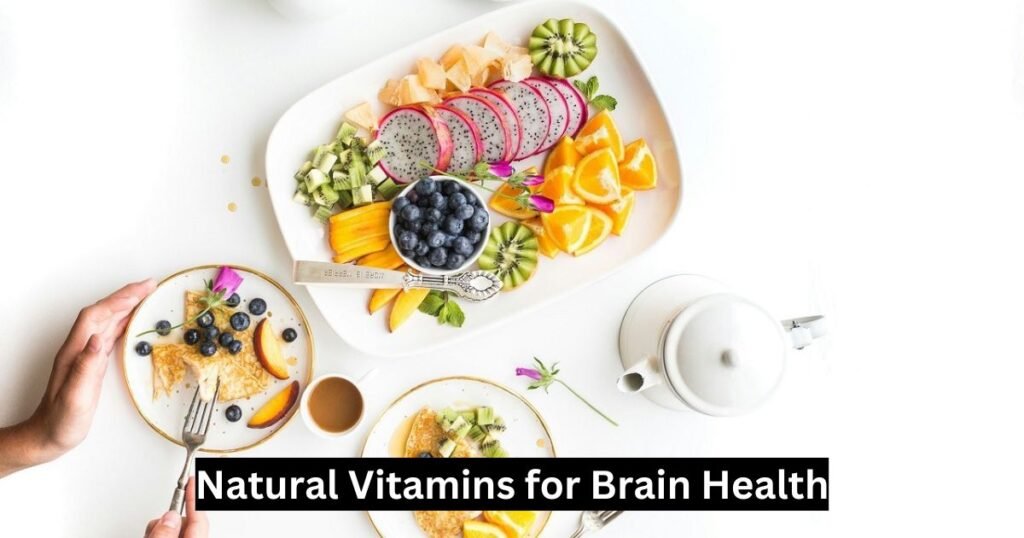Our brain is the body’s control center, managing memory, emotions, movement, and decision-making. It’s the core organ that shapes how we experience and interact with the world. Maintaining brain health is crucial for preserving cognitive function, and natural vitamins for brain health play a key role in supporting long-term cognitive well-being. Yet modern life—filled with stress and environmental challenges—can contribute to cognitive decline over time.
While many people turn to artificial solutions for cognitive enhancement, the best way to support your brain is through natural vitamins and nutrients that promote cognitive health and mental clarity. Natural vitamins can help boost memory, improve focus, and protect against age-related cognitive decline.
In this comprehensive guide, we will explore some of the most effective natural vitamins for brain health, how they work to boost cognitive function, and the best food sources to ensure that you’re nourishing your brain the way it deserves.
Why Brain Health Matters
Before we delve into the vitamins themselves, it’s important to understand why brain health should be a top priority. The brain controls virtually every function in your body, from the most basic motor skills to the most complex cognitive tasks. As you age, it’s not unusual for memory, focus, and overall cognitive function to begin to decline. This decline can lead to various neurological conditions, including dementia and Alzheimer’s disease.
Research has shown that lifestyle choices, including nutrition, can have a profound impact on brain health. In fact, one of the best ways to ensure a sharp mind throughout your life is to regularly consume essential vitamins that promote cognitive function and protect brain cells from damage. Natural vitamins for brain health are a key part of this strategy.

The Top Natural Vitamins for Brain Health
In this section, we’ll explore the five best vitamins that have been shown to support brain health, protect against cognitive decline, and improve mental clarity.
Vitamin B12: Essential for Brain Function and Energy
What It Is: Vitamin B12, or cobalamin, is an essential water-soluble vitamin that plays a vital role in several bodily functions, especially those related to the brain and nervous system. This vitamin is crucial for the production of red blood cells and the maintenance of nerve cells. It’s also involved in the synthesis of DNA and RNA, which are necessary for cell function.
How It Supports Brain Health:
- Cognitive Function: Vitamin B12 is crucial for maintaining the health of neurons, the building blocks of the nervous system. Deficiency in B12 can lead to impaired cognitive function, memory problems, and even depression.
- Brain Shrinkage Prevention: Studies show that B12 deficiency can cause brain shrinkage, leading to an increased risk of cognitive impairment and dementia. For this reason, ensuring adequate intake of vitamin B12 is essential for older adults.
- Mood Regulation: In addition to its cognitive benefits, vitamin B12 is also involved in the production of serotonin, a neurotransmitter that helps regulate mood and emotions. Proper levels of B12 can alleviate symptoms of depression and anxiety.
Food Sources:
- Meat (especially beef, liver, and pork)
- Fish (salmon, tuna, sardines)
- Eggs
- Dairy products (milk, cheese, yogurt)
- Fortified cereals and plant-based milks
Recommendation: If you follow a vegetarian or vegan diet, consider taking a B12 supplement, as it is primarily found in animal products.
Vitamin D: Enhancing Brain Health and Mood
What It Is: Vitamin D is a fat-soluble vitamin that is essential for maintaining healthy bones and supporting the immune system. What many people don’t know is that vitamin D also plays a critical role in cognitive function and brain health. The body produces vitamin D in response to sunlight, making it unique compared to other vitamins.
How It Supports Brain Health:
- Mood Regulation: Low levels of vitamin D are associated with mood disorders such as depression and anxiety. It is believed that vitamin D helps regulate the production of serotonin in the brain, which plays a key role in managing mood.
- Cognitive Function: Adequate levels of vitamin D are linked to improved cognitive function. Research suggests that vitamin D deficiency may accelerate cognitive decline in older adults, particularly those at risk of dementia and Alzheimer’s disease.
- Neuroprotection: Vitamin D has anti-inflammatory and antioxidant properties that protect brain cells from damage, supporting long-term brain health.
Food Sources:
- Fatty fish (salmon, mackerel, sardines)
- Fortified dairy products
- Fortified cereals
- Egg yolks
- Mushrooms exposed to sunlight
Recommendation: Aim to get 15 to 20 minutes of sunlight each day to boost your vitamin D levels. If you live in an area with limited sunlight or are concerned about your vitamin D intake, a supplement may be necessary.
Omega-3 Fatty Acids: Fuel for Your Brain
What They Are: Omega-3 fatty acids are a group of polyunsaturated fats that are vital for overall health. These fats, particularly DHA (docosahexaenoic acid) and EPA (eicosapentaenoic acid), are essential for brain function. The human brain is made up of nearly 60% fat, with DHA being one of the most abundant types of fat in the brain.
How Omega-3s Support Brain Health:
- Cognitive Function and Memory: Omega-3s are crucial for building and maintaining brain cell membranes. DHA, in particular, is integral to the function of neurons, improving communication between brain cells, which enhances memory, learning ability, and overall cognitive function.
- Neuroprotection: Omega-3 fatty acids have anti-inflammatory properties that protect the brain from oxidative stress and inflammation, both of which are linked to neurodegenerative diseases such as Alzheimer’s.
- Mood and Mental Health: Omega-3s play a significant role in regulating neurotransmitters such as serotonin and dopamine, which influence mood, emotional well-being, and mental health. Studies have shown that omega-3 supplementation may help reduce symptoms of depression and anxiety.
Food Sources:
- Fatty fish (salmon, mackerel, sardines)
- Walnuts
- Flaxseeds
- Chia seeds
- Algal oil (for vegetarians and vegans)
Recommendation: Aim to include omega-3-rich foods in your diet at least twice a week. If you’re unable to get enough from food sources, consider taking a high-quality fish oil or algae oil supplement.
Vitamin E: Antioxidant Power for the Brain
What It Is: Vitamin E is a potent antioxidant that helps protect the body from oxidative stress, a condition that occurs when free radicals damage healthy cells. Since the brain is highly susceptible to oxidative stress, vitamin E plays a crucial role in safeguarding brain health and function.
How It Supports Brain Health:
- Oxidative Protection: Vitamin E helps neutralize free radicals in the brain, preventing cellular damage and supporting healthy aging.
- Memory and Cognitive Function: Vitamin E has been shown to help maintain memory function in older adults and may even slow the progression of Alzheimer’s disease.
- Neuroprotection: The antioxidant properties of vitamin E help reduce the damage caused by oxidative stress, which is linked to cognitive decline and neurodegeneration.
Food Sources:
- Nuts and seeds (almonds, sunflower seeds, hazelnuts)
- Green leafy vegetables (spinach, kale)
- Avocados
- Plant oils (such as sunflower and olive oil)
Recommendation: Incorporate vitamin E-rich foods into your diet regularly, or take a supplement if you’re not getting enough through food.
Folate (Vitamin B9): Supporting Cognitive Function
What It Is: Folate, or vitamin B9, is a water-soluble vitamin that is crucial for cell growth and development. Folate plays a significant role in brain health, especially during pregnancy and early brain development. However, it is equally important for adults in supporting cognitive function and mental clarity.
How It Supports Brain Health:
- Memory and Cognitive Function: Folate helps improve memory and cognitive performance by supporting the formation of neurotransmitters involved in mood regulation and cognitive function.
- Mood Enhancement: Folate is known to enhance the action of serotonin, dopamine, and norepinephrine, neurotransmitters that are vital for maintaining a healthy mood and mental clarity.
- Neurodevelopment: Folate is essential for proper brain development in early life. During pregnancy, sufficient folate intake is crucial for the development of the fetus’s brain and nervous system.
Food Sources:
- Leafy green vegetables (spinach, kale)
- Lentils and beans
- Avocados
- Fortified cereals and grains
Recommendation: Folate is found in a wide range of foods, so it’s easy to include in your diet. For pregnant women, folate supplementation is often recommended to ensure the development of a healthy baby.

How to Incorporate These Vitamins into Your Diet
Eating a well-balanced diet that includes a variety of nutrient-dense foods is key to supporting brain health. Here are some practical tips to incorporate the essential brain-boosting vitamins into your daily routine:
- Include Omega-3-rich foods: Eat fatty fish such as salmon or mackerel twice a week. Add flaxseeds or walnuts to your smoothies or yogurt to boost your omega-3 intake.
- Increase Vitamin D levels: Spend some time in the sun each day (if possible). Eat vitamin D-rich foods such as fortified dairy products or eggs, and consider a vitamin D supplement.
- Snack on nuts and seeds: Almonds, sunflower seeds, and walnuts are packed with vitamin E, making them an ideal snack for brain health.
- Eat leafy greens: Include spinach, kale, or other dark leafy vegetables in your salads, soups, and smoothies.
- Consider supplementation: If you find it difficult to get enough of these vitamins through diet alone, speak to a healthcare provider about taking supplements.
See Also: gossiips.com
Conclusion
Nurturing your brain with natural vitamins is one of the most effective ways to maintain cognitive function, protect against brain aging, and support overall mental wellness. By incorporating these essential vitamins into your diet, you can boost memory, improve focus, and protect against neurodegenerative diseases.
Remember, consistency is key. Incorporate these vitamins into your daily routine and enjoy the benefits of a sharper, healthier brain. Whether through diet or supplements, it’s never too early to start prioritizing brain health for a bright and clear future.



